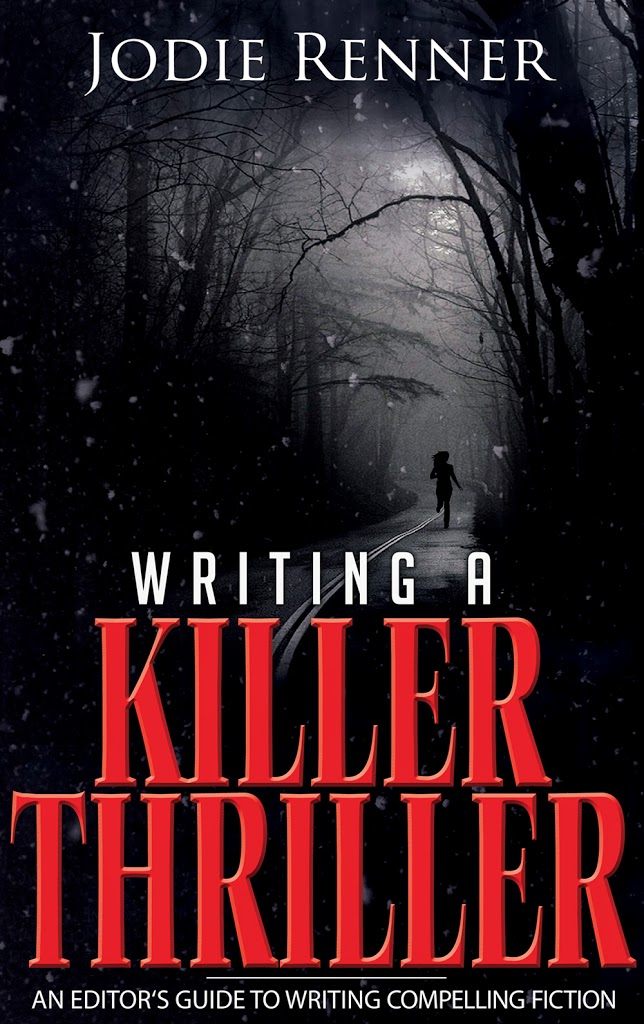by Jodie Renner, editor, author, speaker
In your writing, have you inadvertently created some awkward sentences involving misuse of participles?
In my editing of fiction manuscripts, I find even my smartest, most talented authors sometimes commit gaffes with participles, which can affect the meaning of the sentence. Some readers may notice these style blunders, and others may just feel subliminally confused or inexplicably mildly irritated.
Problems with participles, dangling or otherwise:
Participles are verbs that end in –ing (present participle) or –ed (past participle). According to the Chicago Manual of Style, “The present participle (-ing verb) denotes the verb’s action as in progress or incomplete at the time expressed by the sentence’s principal verb.” In other words, an –ing verb expresses an action that is still taking place when another action occurs.
For example, “As he was driving on the freeway, a police car whizzed past, lights flashing and sirens blaring.” Or “She escaped while the house was still burning.”
So –ing verbs are mainly used for ongoing actions or to indicate an action that is still taking place when another action occurs. Here are some examples of incorrect use of participles:
What’s wrong with these sentences?
Hurrying up the sidewalk, she ran into her office building.
Striding across the lobby, he jabbed the button for the elevator.
Tapping her toes impatiently, she dashed into a free elevator that stopped.
What’s the problem ? Logistics. The -ing verb indicates that the first action is still happening when the second one occurs, but it’s physically impossible. She can’t run into her office building while hurrying up the sidewalk – it’s physically impossible. And if he’s still striding across the lobby, he can’t be jabbing the elevator button. Nor can she tap her toes while dashing into an elevator!
~ Check those sentences starting with -ing verbs.
Newbie writers often start sentence after sentence with -ing verbs (participles). That’s another sign of amateurish writing, and causes logistic problems. Besides being repetitive and boring, this sentence construction usually ends up describing a physically impossible series of actions – sequential actions described as if they’re simultaneous, as in the examples above.
Here’s another one: “Pulling the car over to the curb, she ran up the sidewalk.” She can’t run up the walk while she’s pulling over to the curb. It should be something like, “She pulled the car over to the curb, parked, then ran up the sidewalk.” Or “After pulling the car over to the curb, she jumped out and ran up the sidewalk.”
So vary your sentence structure, and if you start a sentence or clause with an –ing verb, make sure it works.
~ Don’t get caught with your participles dangling!
According to Merriam-Webster, a participle is a word having the characteristics of both verb and adjective. As mentioned above, participles are verb forms that end in –ing or –ed, like “buzzing” or “roaring”, or “satisfied” or “soaked.” A participial phrase modifies a noun, like “Climbing the mountain, the hikers soon grew tired.” The phrase is talking about the activity of the person or thing closest to it, in this case, the hikers, so it’s correct.
Here’s an example of a dangling participle: “Exploring the trails, the birds chirped merrily.” It’s not the birds that are exploring the trails, so it needs to be changed to something like “Exploring the trails, the hikers heard birds chirping around them.” Or “As they explored the trails, the hikers…”
A few more examples of dangling participles:
Wrong:
Dodging the traffic, his cell phone got dropped on the street.
It’s not the cell phone that’s dodging the traffic, so it needs to be:
Right:
Dodging the traffic, he dropped his cell phone on the street.
Or: As he dodged traffic, he dropped his cell phone.
Wrong:
Gazing out the window, the willow tree swayed in the breeze.
This sentence implies it’s the willow tree that’s gazing out the window. It would need to be changed to something like:
Gazing out the window, she saw the willow tree swaying in the breeze.
Or: As she gazed out the window, she saw…
~ Misplaced modifiers are a mistake.
Also, watch where you put your descriptive phrases in sentences, as they modify the words closest to them. For example,
Tall and rugged, the teenage girl gazed at the basketball star in admiration.
As it is phrased here, the “tall and rugged” refers to the teenage girl, when it’s supposed to be describing the basketball star. It should be rephrased to something like:
The teenage girl gazed at the tall, rugged basketball star in admiration.
Similarly with:
Tired and dirty, the lady of the house watched the farm workers trudge past at the end of the long day.
It’s not the lady of the house who’s tired and dirty, so this sentence needs fixing.
The lady of the house watched the tired, dirty farm workers trudge past…
Wrong:
Slathered in chocolate icing with sprinkles, the customers bought boxes of the sweet, decadent donuts.
It’s not the customers who are slathered in icing with sprinkles! This should be changed to something like,
The customers bought boxes of the sweet, decadent donuts slathered in chocolate icing with sprinkles.
And you wouldn’t want to write, “Soaked to the skin, she dried off the kids when they came in from the rain.” Unless the mom is soaked to the skin, too!
 Readers and writers – have you seen or accidentally created some awkward sentences involving misuse of participles? Care to share any humorous ones?
Readers and writers – have you seen or accidentally created some awkward sentences involving misuse of participles? Care to share any humorous ones?
I provide lots of tips, with examples, of these and all kinds of other style gaffes to avoid in my award-winning editor’s guide to writing compelling stories, FIRE UP YOUR FICTION.


